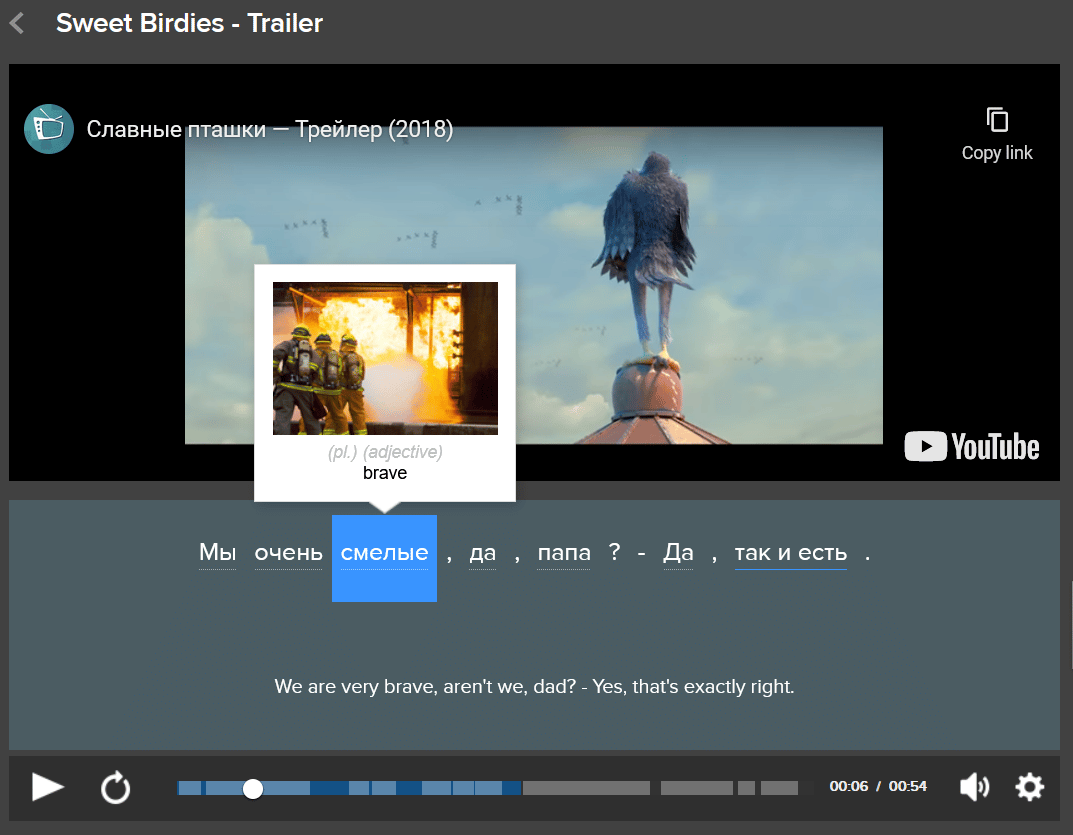
18 Resources for Russian Listening Practice: Podcasts, Audiobooks and More
Whether you’re a beginner or striving for fluency, honing your listening skills is a game-changer.
To do so, you need the right tools that cater to your learning style.
In this guide, you’ll get 18 top-notch resources for Russian listening practice, from music and movies to podcasts and online courses.
Plus, you’ll get some useful tips to enhance your listening comprehension.
Make the most out of your practice sessions with these resources and strategies and you’ll be well on your way to understanding Russian speakers with ease!
Contents
- Videos for Russian Listening Practice
- Russian Movies and TV Series
- Russian Audiobooks
- Russian Podcasts
- Authentic Russian Music
- Online Russian Courses
- How to Learn Russian Through Listening Practice
Download: This blog post is available as a convenient and portable PDF that you can take anywhere. Click here to get a copy. (Download)
Videos for Russian Listening Practice
YouTube
YouTube offers both authentic and learning-based videos. Authentic videos focus on real Russian—the sort of language that native speakers use with each other. For example:
- Научпок answers common questions through animated drawings and a voiceover.
- This is Хорошо (“This is Good”) features a fast-talking Russian guy who gives you the rundown on the most ridiculous videos on the internet.
Russian learning channels on YouTube focus more on speaking in a manner that Russian students can understand and cover topics that Russian students will benefit from.
Learning-based channels like The Russian Grammar Channel and Russian from Russia offer grammar and vocabulary lessons as well as entertaining listening practice like these New Year stories for intermediate learners.
The RussianPod101 channel offers videos for listening practice at the beginner, intermediate and advanced levels. For example, the video below tests your comprehension of dialogues between Russian speakers on a range of topics such as booking a hotel room and ordering food.
FluentU
FluentU is an excellent resource for listening practice—with a video component for visual learners. It teaches you Russian words, phrases and expressions through short clips from authentic Russian media including movie trailers, scenes from TV shows and news segments.
Each video comes with a transcript and interactive subtitles available in both Russian and English. You can hover over any word in the subtitles to see its translation, part of speech and a corresponding image.

By clicking on a word, you’ll also get example sentences, audio pronunciation (at normal and slow speeds) and other videos where it’s used.
After watching a video, you’ll take a personalized vocabulary quiz to test your knowledge of the key vocabulary. You can also add new words to a flashcard deck so you can review and commit them to memory.
Russian Movies and TV Series
Reinforce what you see with what you hear by watching and reading subtitles from these sources:
Learn Russian Language
This YouTube channel offers various Russian films with English subtitles, so you can get to know Russian culture while learning the language.
In the beginning, you may have to read the subtitles to understand the content of the films. But as you improve, try to watch without subtitles to test your knowledge.
To get started, you can check out “Сорок первый” (“The Forty-First”), a Russian classic from 1956 about life during the war in the 40s. Or for something lighter, check out this funny Sherlock Holmes parody.
Netflix
While its Russian selection isn’t huge, there are some great options on Netflix for learning the language and taking in Russian culture.
All of its offerings have English subtitles and some also have subtitles in Russian so you can follow along and brush up on your reading skills.
For example, you can check out the Netflix original film “Dovlatov,” which follows the true story of the Russian writer in the 1970s. He struggles with wanting to stay in Russia while his writings are rejected by the oppressive regime.
Amazon Prime Video
Amazon’s Prime Video streaming service has a pretty good selection of Russian films. You’ll find war dramas, romantic films and sci-fi thrillers.
For example, you can watch “Война и мир” (War and Peace), the epic cinematic adaptation of Leo Tolstoy’s monumental novel which won the 1969 Academy Award for Best Foreign Language Film.
The film was released in four installments spanning over seven hours, so you’ll get plenty of listening practice!
Russian Audiobooks
Books serve many purposes—they educate, entertain and expose us to times, places and situations different from our own. Check out these resources for audiobooks in Russian:
Loyal Books
The best part of Loyal Books is that all of the audiobooks are free! Here are our top picks from their library:
- “Поэмы” (“Poems”) — Listen to 35 poems from the famous Russian poet Alexander Pushkin.
- “Записки из подполья” (“Notes from the Underground”) — This is an existentialist novel from 19th-century writer Fyodor Dostoevsky.
- “Предложение” (“A Marriage Proposal”) — Listen to this amazing play about a marriage proposal by famed Russian author Anton Chekhov.
- “Aesop’s Fables” — This audiobook features a collection of fables collected in Greece between 620 and 564 BC, translated by Russian author Leo Tolstoy.
While these texts might seem difficult for a beginner, it’s important to remember your purpose isn’t to understand every word, but rather to get a feel for the language.
Getting acquainted with the works of Pushkin, Chekhov, Tolstoy and Dostoevsky can help you immerse yourself in Russian culture and learn more about Russian history—both important parts of learning a foreign language.
Amazon
Amazon has a wealth of Russian audiobooks available for purchase. They offer a handy way to sort the books by topic, such as politics, fiction, children’s books, travel, romance, etc.
Amazon users who have a Prime membership can listen to some of the titles for free with an Audible trial or subscription.
Some titles worthy of checking out:
- “Твои первые сказки” (“Your First Fairy Tales”) — This audiobook of fairy tales is perfect for those just beginning to learn Russian. Since they’re designed for children, they feature easy-to-understand language.
- “Рассказ-Сенсация” (“The Sensational Story”) — This audio textbook by Ignaty Dyakov is for elementary/pre-intermediate levels (A1-A2). It’s in the form of a series of detective stories, this one following the adventures of a Guadeloupian banker named George.
Ayguo.com
Ayguo is a great place to get (free) audio recordings of classic Russian literature, along with texts you can use to read along. You can download books or listen to them directly on the site.
For more audiobook options, check out these Russian audiobook resources and recommended titles.
Russian Podcasts
 RussianPod101
RussianPod101
This is a highly professional Russian-learning podcast for beginning to advanced levels. The dialogues are fun and realistic and the podcast does a great job at going in-depth with the language and culture notes.
That said, RussianPod101 can be a bit pricey if you want to take full advantage. Check out our full review of RussianPod101 here.
Very Much Russian Podcast
 Podcasts like this one can help you learn the latest Russian words and phrases, including popular slang and colloquialisms.
Podcasts like this one can help you learn the latest Russian words and phrases, including popular slang and colloquialisms.
This podcast by the site Очень по-русски (Very Much Russian) provides a variety of episodes about all kinds of topics. Every episode is centered around a funny, unique or lesser known slang term or idiom in Russian.
You can listen on the website or download the mp3 file and accompanying PDFs with transcripts in Russian and English. Note that this resource is intended for intermediate to advanced learners.
SBS Russian
 SBS Russian is a great podcast for listening to the news in Russian. The episodes primarily focus on the goings-on in Russia and Australia.
SBS Russian is a great podcast for listening to the news in Russian. The episodes primarily focus on the goings-on in Russia and Australia.
You’ll listen to clips such as “Victoria bans mobile phones at schools,” “Russian community is outraged over travel agency collapse” and “Calls for strong government action as drug deaths spike.”
There’s also a regular “This week in Russia” segment to keep you up to date on the culture and events in the country.
Speaking Russian
 Speaking Russian is an educational podcast that helps its listeners learn the basics of the Russian language.
Speaking Russian is an educational podcast that helps its listeners learn the basics of the Russian language.
It’s an ideal podcast for beginners, as it covers simple concepts like how to address people in Russian, how to say goodbye, how to count and how to say the days of the week.
Episodes are under five minutes long, so Speaking Russian is perfect for learners with limited time on their hands.
Russian Podcast

Each podcast comes with a PDF transcript of the conversation as well as a word list with English translations for the beginner and intermediate podcasts and definitions in Russian for the advanced ones.
If podcasts are your thing, check out this list of other podcasts for Russian learners, many of them free.
Authentic Russian Music
Station.ru
 This is Moscow’s Dance Radio station featuring music videos, clips and other programs. The music can be heard online or through a mobile phone or tablet.
This is Moscow’s Dance Radio station featuring music videos, clips and other programs. The music can be heard online or through a mobile phone or tablet.
Station.ru allows users to pick between different streaming radio stations. The stations list many of the artists’ names in English and you can easily add the artists you like to your favorites list.
Check out this channel for relaxing music to help you fall asleep. And since the music is slower, it’s much easier to understand the lyrics than on fast tracks.
RusRadio.ru
 Lyrics can be difficult enough to understand in your native language. Listening practice through music is definitely for the advanced Russian student.
Lyrics can be difficult enough to understand in your native language. Listening practice through music is definitely for the advanced Russian student.
With this online music channel, you can listen to current Russian radio, hits from the 90s and more.
You can get familiar with top Russian artists like Полина Гагарина (Polina Gagarina), SEREBRO and Слава (Slava).
Radio.net
 Radio.net lets you listen to radio stations from around the world, including Russia.
Radio.net lets you listen to radio stations from around the world, including Russia.
You can listen to over 700 Russian radio stations online covering pretty much every genre.
In addition to music, there’s also talk radio which will expose you to authentic conversation at a natural speed. You can listen online or download the app for iOS or Android devices.
Online Russian Courses
Language Trainers’ Listening Tests
 Before you start perfecting your Russian listening skills, it’s very helpful to know your starting point. Language Trainers provides free tests to verify how much Russian you actually understand.
Before you start perfecting your Russian listening skills, it’s very helpful to know your starting point. Language Trainers provides free tests to verify how much Russian you actually understand.
Their elementary and intermediate tests feature a listening component in Russian along with comprehension questions in English.
Once you know where you stand with your Russian skills, you can choose the appropriate sources to learn Russian online.
Russian for Free Dialogues
 The audio dialogues from Russian for Free will let you hear native speakers in natural conversations talking about everyday topics such as housework, holidays and traveling.
The audio dialogues from Russian for Free will let you hear native speakers in natural conversations talking about everyday topics such as housework, holidays and traveling.
You can select from beginner, intermediate or advanced dialogues. For focused practice, this site offers the transcript for the dialogues in both English and Russian.
This allows you to find the translation of unfamiliar words and phrases while you listen and practice saying the sentences after hearing them.
How to Learn Russian Through Listening Practice
By following the right strategies, you can tune into these listening resources with purpose and precision. Here are some steps to maximize your Russian listening practice:
- Practice active listening. Active listening requires you to focus on the task at hand only. Be sure to free yourself from any other distractions while listening to ensure you take something away from the content. That being said, engaging in some passive listening while you do mindless tasks will also increase your exposure and familiarity with the language.
- Listen and repeat. While you’re listening to Russian audio, pause and repeat difficult and common words and phrases. This will help you learn the right pronunciation and train your brain to say them correctly. It’s especially important for those infamously long Russian words that are full of consonants, accent marks and neuter signs.
- Accept that you won’t understand everything. When you’re trying to improve your listening skills, you won’t understand everything… and you don’t have to. Don’t get hung up on what you don’t know unless it seems to be a key point. Instead, as you listen, take what you understand of the context and try to make inferences on what you’ve missed.
- Look up the meanings of new words. While you won’t understand everything, you can use your listening practice to learn new words. To avoid interrupting the flow, you can write down unfamiliar words and look them up afterward with a Russian dictionary app. Then add them to your flashcard app to practice until they’re part of your vocabulary.
- Train your ear with scripts and subtitles. When you watch a Russian movie with same-language subtitles or listen to an audiobook while reading along with the print version, you can compare the words as they’re written to the words as they’re actually spoken. That’ll train you to recognize full sentences even when some of the words get under-stressed or swallowed.
- Use technology to slow down the audio. If you have a copy of a Russian-language audio file, audio editing programs such as Audacity allow you to slow down the playback to a more manageable pace. That means you can enjoy all kinds of authentic Russian content at the best pace for your proficiency level.
- Answer questions to test your comprehension. Take advantage of the comprehension questions included with some listening resources, or come up with your own questions to ask yourself. As you listen, take notes on words, phrases or ideas that you didn’t quite understand. Try to pinpoint and address what exactly blocked your understanding.
- Create a summary of what you’ve listened to. To improve your focus while listening to a given audio or video resource, assign yourself a summary of the main points and/or details afterward. You can do this by writing or speaking. Knowing that you’ll have to summarize will force you to listen attentively, and you’ll get practice mentally organizing and recalling what you hear.
- Diversify your listening sources. Don’t just stick to one type of input. Branch out! Have fun with podcasts for learners, podcasts for native speakers, films, TV shows and real conversations with language partners, online or offline. Enjoy information and entertainment, pre-recorded and live speech, learner-directed and authentic materials.
When it comes to Russian listening practice, great resources like the ones above will make your study time more effective and enjoyable.
With a variety of different kinds of audio resources, you can choose what best fits your learning style and keeps you engaged as you grow your language skills.
Download: This blog post is available as a convenient and portable PDF that you can take anywhere. Click here to get a copy. (Download)





![Maximize Your Potential Through the Power of Your Subconscious Mind to Create Wealth and Success [Russian Edition] Maximize Your Potential Through the Power of Your Subconscious Mind to Create Wealth and Success [Russian Edition]](https://m.media-amazon.com/images/I/51VUYaTpDmL.jpg)


